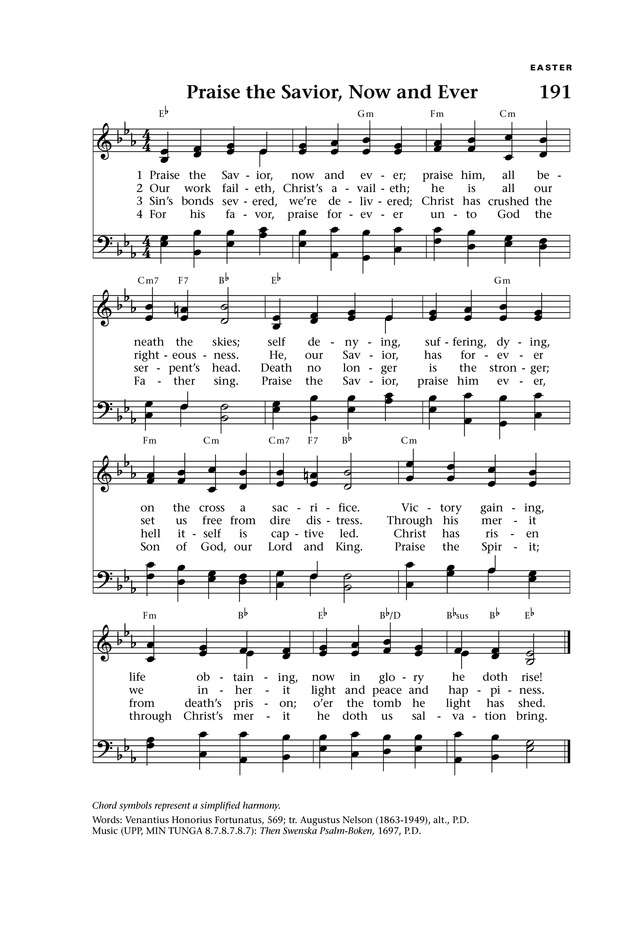Pange Lingua Gloriosi Proelium Certaminis
Pange Lingua Gloriosi Proelium Certaminis (English: Sing, tongue, the battle of glorious combat) is a sixth-century Latin hymn generally credited to the Christian poet St. Venantius Fortunatus, Bishop of Poitiers, celebrating the Passion of Christ. In the Catholic Church, the first five stanzas are used at Matins during Passiontide in the Divine Office, with the remaining stanzas (beginning with Lustra sex) sung at Lauds. Both parts are chanted during the Adoration of the Cross on Good Friday.
This hymn later inspired Thomas Aquinas to write the hymn Pange Lingua Gloriosi Corporis Mysterium for the Feast of Corpus Christi.
This hymn is incorporated into the prologue of Gustav Holst's Hymn of Jesus.
Latin text

- Pange, lingua, gloriosi proelium certaminis
- et super crucis trophaeo dic triumphum nobilem,
- qualiter redemptor orbis immolatus vicerit.
- De parentis protoplasti fraude factor condolens,
- quando pomi noxialis morte morsu corruit,
- ipse lignum tunc notavit, damna ligni ut solveret.
- Hoc opus nostrae salutis ordo depoposcerat,
- multiformis perditoris arte ut artem falleret
- et medelam ferret inde, hostis unde laeserat.
- Quando venit ergo sacri plenitudo temporis,
- missus est ab arce patris natus orbis conditor
- atque ventre virginali carne factus prodiit.
- Vagit infans inter arta conditus praesaepia,
- membra pannis involuta virgo mater adligat,
- et pedes manusque crura stricta pingit fascia.
- Lustra sex qui iam peracta tempus implens corporis,
- se volente, natus ad hoc, passioni deditus,
- agnus in crucis levatur immolandus stipite.
- Hic acetum, fel, arundo, sputa, clavi, lancea;
- mite corpus perforatur; sanguis, unda profluit,
- terra pontus astra mundus quo lavantur flumine.
- Crux fidelis, inter omnes arbor una nobilis,
- nulla talem silva profert flore, fronde, germine,
- dulce lignum dulce clavo dulce pondus sustinens.
- Flecte ramos, arbor alta, tensa laxa viscera,
- et rigor lentescat ille quem dedit nativitas,
- ut superni membra regis mite tendas stipite.
- Sola digna tu fuisti ferre pretium saeculi
- atque portum praeparare nauta mundo naufrago,
- quem sacer cruor perunxit fusus agni corpore.
English Translation
This is not a translation of the above Latin chant - but a Protestant replacement of the 5th Century Catholic verse.

The hymn was translated into English as 'Praise the Savior' by the nineteenth-century Swedish minister Johan Wallin. It is usually set to tune UPP, MIN TUNGA.[1]
Praise the Savior now and ever;
praise him, all beneath the skies;
self denying, suffering, dying,
on the cross a sacrifice.
Victory gaining, life obtaining,
now in glory he doth rise!
Our work faileth, Christ's availeth;
he is all our righteousness.
He, our Savior, has forever
set us free from dire distress.
Through his merit we inherit
light and peace and happiness.
Sin's bonds severed, we're delivered;
Christ has crushed the serpent's head.
Death no longer is the stronger;
hell itself is captive led.
Christ has risen from death's prison;
o'er the tomb he light has shed.
For his favor, praise forever
unto God the Father sing.
Praise the Savior, praise him ever,
Son of God, our Lord and King.
Praise the Spirit; through Christ's merit
he doth us salvation bring.
References
- ↑ "Praise the Savior". Hymnary.org.
External links
- Gregorian chant of the Crux fidelis / Pange lingua on YouTube
- "Pange Lingua Gloriosi (Explanation report and rhymed translation Sing loud the conflict, O my tongue". Catholic Encyclopedia.
- Rhymed translation: Sing, my Tongue, the Glorious Battle including a doxology (Glory be) strophe